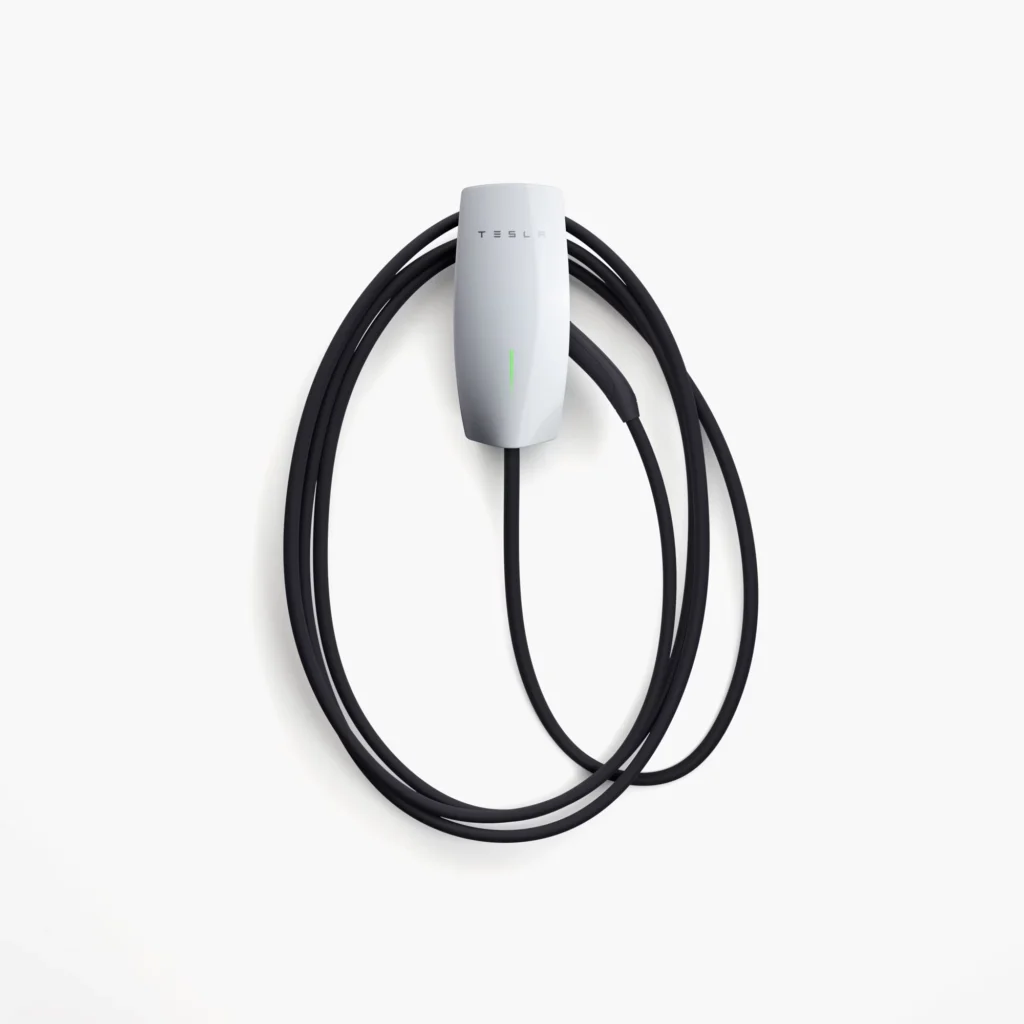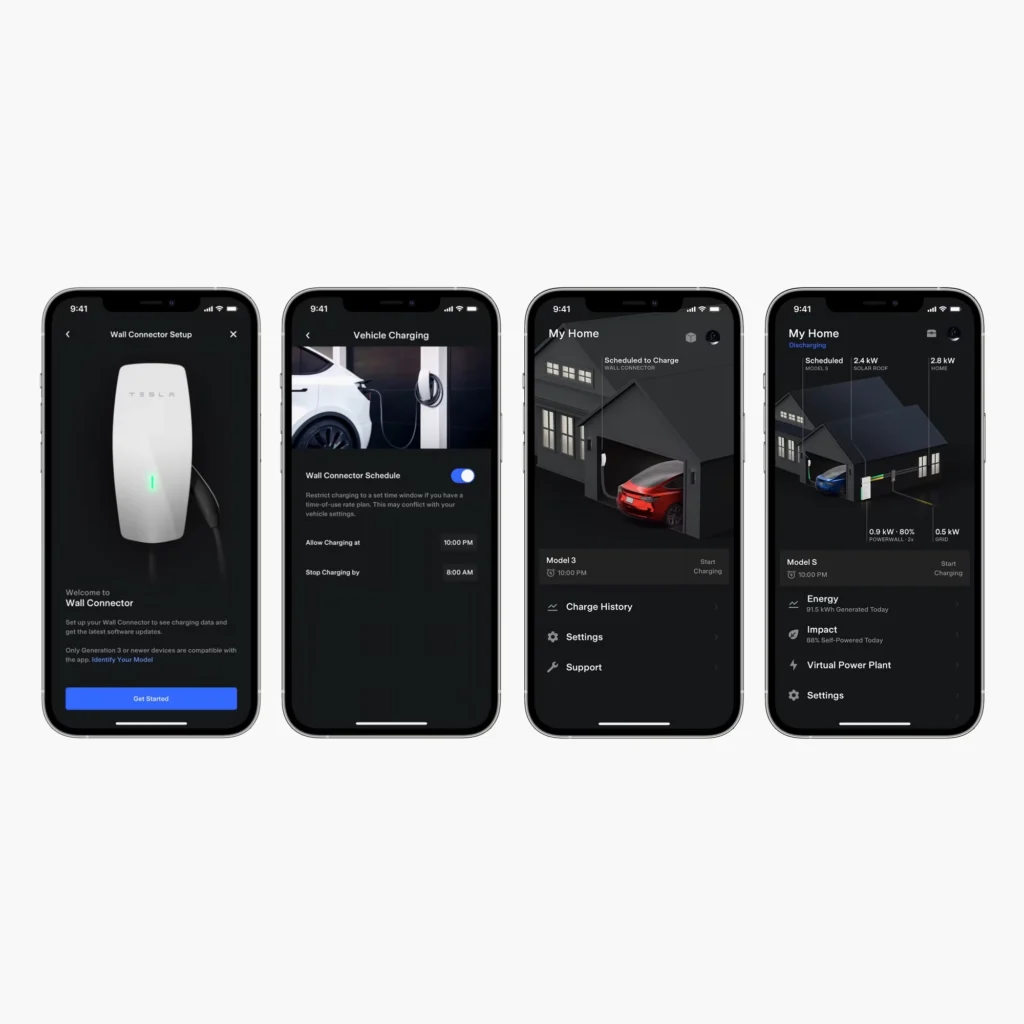Description:
The Wall Connector stands out as the most convenient charging solution for homes, apartments, hospitality properties, and workplaces.
Features:
- Adds up to 44 miles of range per hour with an 11.5 kW / 48 amp output.
- Auto-sensing handle facilitates easy opening of the charge port.
- Monitor and manage your charging schedule and usage through the Tesla app.
- Wi-Fi connectivity enables over-the-air updates, remote diagnostics, and access controls.
- Versatile design suitable for both indoor and outdoor use.
- Variable amperage configurations based on installation location.
- Power-share capability with up to six Wall Connectors.
- Comes with a 24-foot cable length.
- Residential use is backed by a four-year warranty.

Incentives:
Local Electricity Incentives:
Installation Guidance and Support:
The Wall Connector installation requires the expertise of a qualified electrician. To get a quote, you can visit our Find a Certified Installer page, where you’ll find over 1,000 Tesla Certified Installers.
Wall Connector Support:
Commercial Properties:
Property managers, developers, and commercial real estate owners have the opportunity to join our growing network of Charging Partners. By installing the Wall Connector as a public or private amenity, they can benefit from pay-per-use functionality and 24/7 remote monitoring. This setup not only enhances customer experience but also attracts new and repeat customers with fast EV charging.
Tesla Raises Price of NACS Wall Connector Again
Tesla’s widely used home charging solution has seen a slight price increase, though it remains more budget-friendly than many competitors.
Tesla has implemented a second price hike for its Wall Connector this year. In January 2023, the cost of the popular home charging solution went up from $350 to $425. Now, the company has raised the price by an additional $50, bringing the new total to $475.
Despite this increase, the Wall Connector continues to be one of the more economical choices for home charging. For comparison, the Ford Connected Charge Station with the J1772 port is priced at $800, and the Pulsar Plus 48 EV, another wall box charger we previously reviewed, costs $700. Considering the safety certification, warranty, and similar features of Tesla’s level two charger compared to its competitors, it still stands out as a cost-effective option.
Last year, Tesla reduced the price of its home charger to $350 when it opened up its proprietary North American Charging Standard (NACS) for other automakers to adopt.
Recently, General Motors announced its plans to adopt the Tesla charging standard starting in 2024, providing customers with an adapter, while future models will come with built-in NACS ports. Ford made a similar announcement in late May 2023, and Aptera Motors, known for its solar-powered car, was the first to declare the adoption of NACS last year.
It’s worth noting that the Wall Connector’s specifications remain unchanged. The 48-amp unit can charge at 11.5 kilowatts, adding up to 44 miles of range per hour. It features an auto-sensing handle to open the charge port, Wi-Fi connectivity for over-the-air updates, scheduled charging, and data tracking via the Tesla App, power sharing with up to six Wall Connectors, a four-year warranty for residential use, and a 24-foot cable length.
Tesla’s J1772 connector, compatible with most North American electric vehicles, maintains its price at $550, offering similar specifications to the standard home charger with the NACS port.
If you charge your Tesla at home, share your charging routine with us in the comments!
- Visit the Tesla Store
- Rating: 4.8 out of 5 stars (412 ratings, 38 answered questions)
- Recent Purchases: 1,000+ bought in the past month
- Price: $475.00
- Available Options: Lower price available from other sellers, though Prime shipping may not be included.
| Brand | Tesla |
| Color | White |
| Product Dimensions | 13.6″D x 4.3″W x 6.1″H |
| Item Weight | 10 Pounds |
| Current Rating | 48 Amps |

About this item:
- Compatibility: Wall Connector is compatible with all Tesla models: Model S, Model 3, Model X, and Model Y.
- Charging Speed: Up to 44 miles of range per hour of charge, with up to 11.5 kW / 48 amp output, depending on Tesla model and breaker size.
- Convenience: Indoor or outdoor installation (by your electrician or one of the 1,400+ Tesla Certified Electricians) with variable amperage that allows max output customization to an existing power supply. Supports any output up to 48A. Possible max output configurations include: 48A, 40A, 32A, 24A, 16A, 12A.
- Connectivity: Connecting the Wall Connector to a local Wi-Fi network enables over-the-air firmware updates for continual product improvements and remote access control.
- Power-Share: Ideal for locations needing to charge multiple Teslas simultaneously. Power-share allows linking up to six Wall Connectors for efficient power management.
- Tesla App: Optimize utility pricing with the ‘Scheduled Departure’ feature and view ‘Charge Stats’ within the Tesla app for low, overnight pricing advantages.
Frequently Asked Questions (FAQs) about Electric Vehicles and Charging:
1. What is an electric vehicle (EV)?
- An electric vehicle (EV) is a type of automobile that is powered by electricity stored in batteries. It uses an electric motor for propulsion and produces zero tailpipe emissions.
2. How does charging an electric vehicle work?
- Electric vehicles are charged by connecting them to a charging station, which supplies electrical energy to the vehicle’s battery. There are various charging levels, including Level 1 (standard household outlet), Level 2 (home or public charging station), and Level 3 (fast DC charging stations).
3. What is the difference between AC and DC charging?
- AC (alternating current) charging is typically slower and is commonly used for home charging (Level 1 and Level 2). DC (direct current) fast charging provides a higher charging rate and is commonly found at public fast-charging stations (Level 3).
4. How long does it take to charge an electric vehicle?
- Charging time varies based on the charging level and the electric vehicle’s battery capacity. Level 1 charging can take several hours, Level 2 charging usually takes a few hours, while Level 3 fast charging can provide a significant charge in around 30 minutes.
5. What is a kilowatt-hour (kWh) and how does it relate to EV charging?
- A kilowatt-hour is a unit of energy measurement. In the context of electric vehicles, it represents the amount of energy needed to power a vehicle for one hour. The charging speed is often measured in kilowatts (kW), indicating how quickly energy is transferred to the vehicle’s battery.
6. What are the different types of electric vehicle chargers?
- There are three main types: Level 1 chargers (standard household outlets), Level 2 chargers (home or public charging stations), and Level 3 chargers (fast DC charging stations). Each level provides a different charging speed.
7. Can I charge an electric vehicle at home?
- Yes, many electric vehicle owners charge their vehicles at home using Level 1 or Level 2 chargers. It’s convenient and ensures a fully charged vehicle each morning.
8. What is a Tesla Destination Charger?
- Tesla Destination Chargers are high-power Level 2 charging stations located at various destinations like hotels, restaurants, and parking garages, designed to provide Tesla owners with convenient charging options while away from home.
9. How do I find electric vehicle charging stations?
- You can use various apps and websites dedicated to electric vehicle charging station locators, including those provided by car manufacturers, charging networks, and third-party developers.
10. Are there any government incentives for electric vehicle owners?
- Many countries and regions offer incentives such as tax credits, rebates, and reduced registration fees for electric vehicle owners. Check with your local government or energy provider for available incentives.